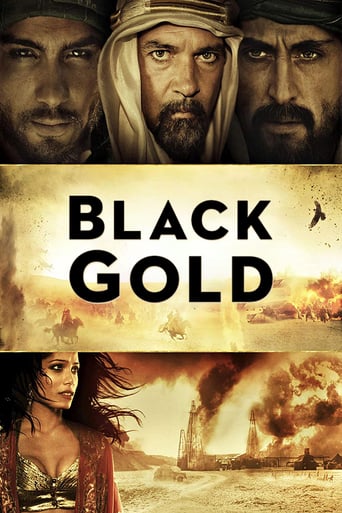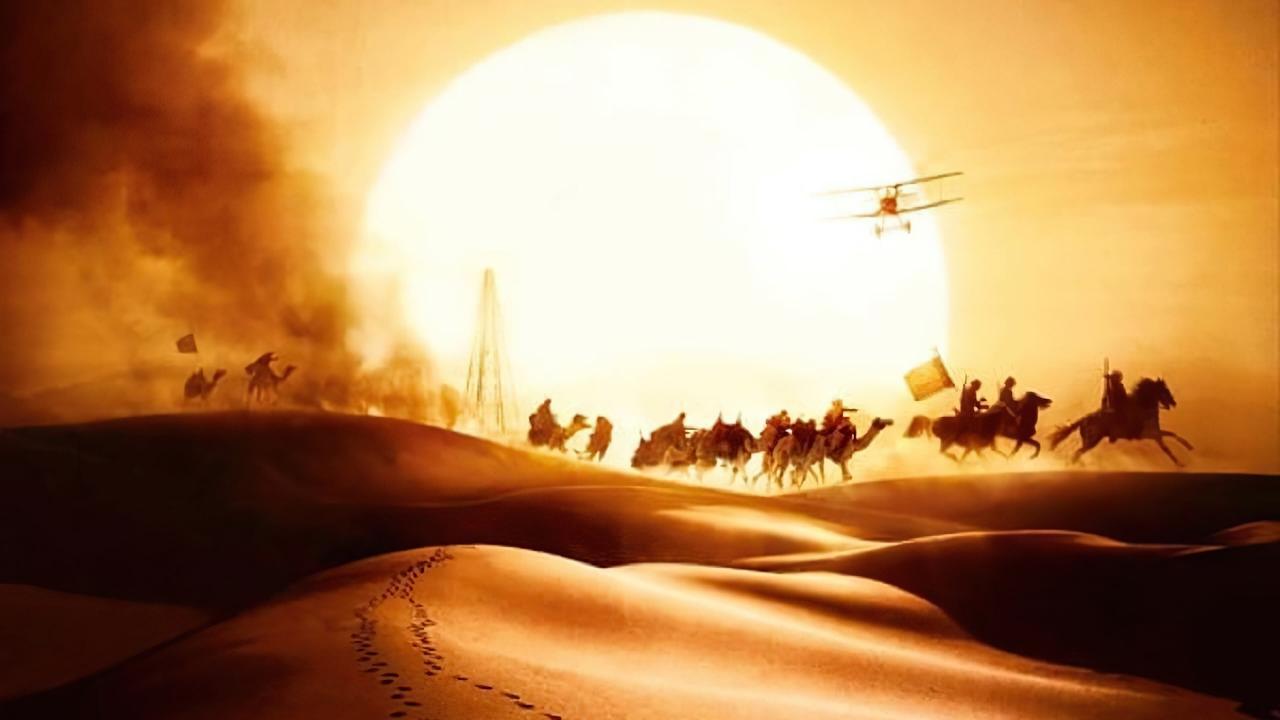SnoopyStyle
Emir Nesib of Hobeika (Antonio Banderas) and Sultan Amar of Salma (Mark Strong) are rivals, and they have set aside The Yellow Belt between the two tribes as a no-man's land. Amar's two sons are taken by Nesib as hostages to keep the peace. When Texas oilmen finds oil in the Yellow Belt, Nesib uses the oil to modernize but Amar refuses to accept the violation of their peace treaty. Amar's son Prince Auda (Tahar Rahim) is caught in the middle trying to bring the opposite sides together. Freida Pinto also stars as Princess Leyla.They are trying to bring a compelling piece of history to life. The time when Texas oilmen first meet the Arab world. They try to intermix some Hollywood melodrama with some more traditional Arab insights. It makes it feel like less authentic, but it does have some great adventures. There are no absolute bad or good from the two leaders as Auda tries to navigate both world. Nesib is trying to gain modernity for the good of his people. Amar sees the gold that comes from the oil as little value and mostly corrupting. I don't know if anything is truly resolved in the end with both sides of the argument undefeated. In fact, the death of Amar is a complete cop-out. It leaves a big question completely unanswered. I think there is a better movie to be made about that era.
John Raymond Peterson
Director/writer Jean-Jacques Annaud is not a newcomer, in fact, he's the director of such great films as 'The name of the Rose', 'Seven Years in Tibet' and 'Enemy at the Gates', to name a few; so the movie was well worth considering in my opinion. The movie is based the novel 'Arab' by Hans Ruesch, a born storyteller, according to The New York Times Book Review; looking up the life story of Ruesch, I was even more fascinated and thus chose to watch it. It did not hurt a bit that Mark Strong and Freida Pinto were starring in the flick; I like both of them. In the case of Antonio Banderas, he's in so many movies, some I don't care for but others I very much enjoyed (The Skin I live In, Haywire) lately, I don't tend to dismiss his participation as it may be too easy to do.I was not familiar with the lead actor, Tahar Rahim, but if Annaud picked him, it was for good reason. He delivered a splendid performance of his character Prince Auda. That character is a much more likable one then that of Lawrence (in Lawrence of Arabia), both of whom are shown to be historical figures, one, a real person, the other a fictional one. I would not attempt to make comparisons between the two films, that would be ludicrous; but it does not take away the beauty I saw in 'Black Gold' a.k.a. 'Day of the Falcon'.I won't, repeat or write up a new description of the story, as the IMDb full storyline is quite on point; so I refer you to it. I will, however, add that the lead character, Prince Auda is depicted as a unifying force, as was Lawrence, but in a diametrically different way, and that made the whole story stand on its own. Auda is the opposite of brutal, he is considerate, and it takes just as much will and courage to be one as it does the other.Annaud does a fine job of conveying the harshness of the desert life, as well as David Lean did for the classic tale. Thankfully, in 'Black Gold' there is a female character of some significance, that of Princess Leyla, played by Freida Pinto, a stunningly beautiful and also wise princess, daughter of Emir Nesib, played by Antonio Banderas. Auda is one of Sultan Amar's two sons. Amar, played by Mark Strong, is arch-rival of Nesib, and also the smarter of the two, though not one with as much foresight as either his son Auda or Nesib himself. I was most pleased with the development of the story and the final outcome. I hope you too will be.
socrates99
I remember when Lawrence of Arabia came out, long ago. The most stunning things about it were Peter O'Toole, the haunting music, and the hard won shots of the desert. I would have traded it all to learn the details of desert warfare, but it failed to do more than offer a glimpse. Instead it wallowed in Lawrence's tortured mind to little purpose, creating a deeply dissatisfying movie. Now, years later, my antidote has come in the form of a real story, the kind I longed for as a kid, but seldom found. If you consider the people of the Arabian desert savage, superstitious barbarians, you won't be able to enjoy this movie. But if you can suspend your prejudice long enough to be convinced, they do a fine job of conveying how a totally foreign and ancient culture can make more than a little sense in today's world. Is it all fantasy, these unusually noble men with their deep distrust of western values? I doubt it. There are always ineffable things about a people's true dreams and character that have little to do with their actual history, that can only really be expressed in art. If I were Arab I'd be very happy to see a movie like this about how my forefathers reacted to the first oil wells and the riches they promised.The lead, Tahar Rahim, is spot on as the bookish Prince Auda, turned fighter. His father Mark Strong as the Sultan Amar has some of the best lines and is a strong and welcome presence throughout. Antonio Banderas worked for me as Emir Nesib and I admire his entire career. There's no doubt in my mind he was fully committed to this movie though some apparently found his performance distracting; I did not. As others have pointed out, Freida Pinto and Liya Kebede, as the female leads, are both fairly wasted here though there's something true about how minor their roles are given this is mostly a story about change, war and father-son relations.No, I might forever be labeled a low brow for writing this, but I enjoyed this film much more than I did the highly acclaimed Lawrence of Arabia. This is a far more earnest and effecting film and deserves a great deal more praise than it's likely to get in the west given our politics. That's truly a shame as we could use a little sympathy and insight into these people.
DICK STEEL
I suppose this would have been a lot more interesting if there's some truth ringing in it, versus having to base it on fictitious elements that are seductively compelling if based on a true story about the founding of a nation. It had ambitions to be as epic as Lawrence of Arabia, but this Doha Film Institute backed film set in the early 1900s is probably one of the first being sponsored by an Arab nation, to tell a story about Arabs in the Arabian land. And curious enough, it laid down some lessons learnt about the insatiable demand and corruption of morals that oil and its wealth bring, yet also provided a balanced view on how such wealth, if used judiciously, could benefit subjects of its kingdom.And that view of being backward, and needing to propel themselves forward to be on par with the Western nations, is held keenly by Emir Nesib (Antonio Banderas), whose kingdom gets ravaged by disease once too many times, and laments that he rules over nothing but endless sand. That is until the Texan Oil company reveals the abundance of oil underneath that will bring about riches to the tune of 100,000 barrels of crude per day at US$1 per barrel, per oil well. Do the math, and any kingdom will open its coffers to that kind of money. Except for Nesib's rival Sultan Amar (Mark Strong), the weaker of the two kingdoms who had agreed upon an uneasy truce with Amar giving up his two sons to Nesib, for the latter to raise, which will effectively guarantee no further attempts of an invasion or war.The story soon shifts to more politicking many years later, with the realization of god provided riches buried underneath, that eyes are now turned toward milking a piece of No Man's Land. The next act deals with the many politicking and schemes from Nesib, who decides to negotiate a new contract, and cunningly uses Amar's sons Saleeh (Akin Gazi) and Auda (Tahar Rahim) as barter, in addition to Auda's marriage to Nesib's daughter Leyla (Freida Pinto) as leverage, effectively making the two houses relatives. And this is just the tip of the iceberg, before it ventures into action-adventure tradition, hinged with a certain amount of spirituality about being the chosen one and all that jazz, with the rise of a saviour that will unite all tribes and decide whether to consort with oil money from the West.Director Jean-Jacques Annaud's film has many ideas put together into one long narrative, which if given the time to develop, would have been an epic. Unfortunately, time is not provided, and the film had to be told at such a pace, things seem to happen in linear fashion without much reason, other than to try and squeeze as many elements as possible into a film. Things like the ideological battle between forward thinkers and traditionalists, and the battle between different schools of religious thoughts, make the film richer than it could be, adding a little contemporary slant where moderates have to battle extremists, and those who interpret texts selectively for their own advantage. The word "infidel" is used countless of times in various contexts, and it would have been nice if these subplots were developed further, rather than becoming just a footnote that was in the way, to be brushed aside soonest possible.Those into action have adequately crafted battle sequences in the desert, where Auda becomes like Dune's Paul Atreides in seeing his knowledge gained from extensive book research translate to very effective battle strategies, complete with fights on horseback and camel-back, while extrapolating the modern versus traditional theme in having swords go up against mechanized weapons from tanks to airplanes. Production values in all aspects are kept exceptionally high and lush, from costumes to sets out there in desert land, with many scenes done the old school way rather than to chalk up numbers through CG.One may also be attracted by the ensemble star cast assembled for the film, with the likes of Antonio Banderas and Mark Strong as rivals, though the latter had reduced screen time when compared to the former, which was a more interesting character for his moral ambiguity, never shying away to offer a bribe to have things done his way, versus Strong's Amar that was the contrast upright, though uptight, ruler who is almost resigned to his fate that he cannot change history. Both make way for the younger cast such as Tahar Rahim, who is excellent as the narrative shifts its focus to chart his character's meteoric rise utilizing traits earned and learned from both fathers, while Freida Pinto was sorely under-utilized.The film may at certain junctures behave a little xenophobic given its characters' rather vocal opposition of Westerners and their presence, although nailing it in the head to comment on their unending thirst for oil, but the irony is that many characters were played by non-Arabs, most likely to sell the movie abroad.


 AD
AD




